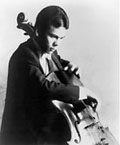One of the more heartening developments on the local classical scene is the the well-established Seattle Chamber Music Festival’s steady blossoming into new areas of repertory.
Their concerts, both last July’s main series at Lakeside School and last weekend’s Winter Interlude at Benaroya Hall, achieve a near-ideal balance of familiar and unfamiliar, old and new. Festival director Toby Saks serves the audience (and the SCMF has an audience as loyal and enthusiastic as any local institution) by satisfying their curiosity as well as comforting them with beloved standards. Saks, a cellist, understands that it’s curiosity that sets the true music lover apart from the casual consumer.
Seattle Chamber Music Festival: Winter Interlude
Nordstrom Recital Hall, Benaroya Hall
January 7-9
Saks compliments her audience with every appearance of works like Henry Cowell’s A Set of Five, Ned Rorem’s Trio for Flute, Cello, and Piano, or Bartok’s Contrasts. American maverick Cowell is a composer Saks has been loyal to, giving listeners several chances to get to know his music. A Set of Five, from 1952, made a sensation at its first Festival performance in 1996, and Cowell’s Homage to Iran for the same combination of piano, violin, and percussion was similarly well received in 1997. Combining scurrying, lightning-fast virtuoso passages (which present superhuman coordination problems) with startling and tasty percussion sounds (gongs, xylophone, celesta, tuned glass bowls), A Set of Five, heard last Friday, is an innovative and iconoclastic piece that was also a genuine crowd-pleaser, especially in the hands of violinist Soovin Kim, pianist Anton Nel, and percussionist Matt Kocmieroski.
Rorem’s 1960 Trio, a showy blend of angst-ridden angularity and liquid lyricism, poses similar challenges, with fast complex syncopations given to all three instruments at once. Flutist Jody Schwarz, cellist Bion Tsang, and pianist Craig Sheppard played it last Sunday with splendid fire and accuracy; Tsang’s third-movement soliloquy was especially ravishing. In the Saturday performance of Bartok’s Contrasts, pianist Wendy Chen, violinist James Ehnes, and clarinetist Frank Kowalsky weighted this gritty work toward the dark end of the emotional spectrum; the somber moments were crushingly bleak, and even the exuberant ones still glowered a bit.
Shostakovich’s music is always popular around these parts, even a heavy piece like his Trio No. 2 from 1944. Ehnes, Tsang, and Chen gave a powerfully focused performance Friday, realizing that no matter how frenzied the music gets, it’s always about control, never abandon. They brought at once pathos and a fine dark irony to the Jewish-influenced folk themes prominent throughout the piece. On Saturday, Sheppard and baritone Julian Patrick offered four of a set of 12 Cabaret Songs by master eclectic William Bolcom, in styles ranging from lounge jazz to German expressionism to gospel, klezmer, and Broadway. Never were printed texts more unnecessary; with Bolcom’s jewel-like word setting and Patrick’s flair and diction, every syllable was clear and the wry poems made their full effect.
Completely new to me was the name Bernard Andr鳬 whose Narthex was played Friday by Schwarz and harpist Heidi Lehwalder. The 1971 duet turned out to be a good-humored bit of kitsch exotica seemingly straight from the soundtrack of a sword-and-sandal epic. Andr鳠was generous with instrumental effects (knocks and scrapes on the harp, the flute mouthpiece played alone), but worked less diligently at making memorable music out of them. Standard repertory included works by Brahms, Debussy, Dvorak, Haydn, and Schubert; a caressing performance of Brahms’ Clarinet Quintet with Kowalsky at the helm (Friday) was also a delight.







